Diary of Horatio Collins King, Spring 1857

Horatio Collins King's diary during the spring of his third year at Dickinson College. King is a member of the class of 1858. Transcript included.


Horatio Collins King's diary during the spring of his third year at Dickinson College. King is a member of the class of 1858. Transcript included.

Horatio Collins King's diary during the fall of his third year at Dickinson College. King is a member of the class of 1858. Transcript included.

Horatio Collins King's diary during the spring of his second year at Dickinson College. King is a member of the class of 1858. Transcript included.

Horatio Collins King's diary during the fall of his second year at Dickinson College. King is a member of the class of 1858. Transcript included.

Horatio Collins King's diary during the spring of his first year at Dickinson College. King is a member of the class of 1858. Transcript included.

Horatio Collins King's diary during his first semester as a student at Dickinson College. King is a member of the class of 1858. Transcript included.

Rev. Charles Collins, the eleventh president of Dickinson College, writes this short biography of Rev. Charles Nisbet, the first president of the College, in 1853.

President Charles Collins writes this short history of Dickinson College in 1856.
Charles Collins, "Dickinson College," The Ladies' Repository 16 (August 1856): 449-453.
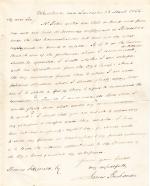
James Buchanan declines to put in a "kind word" for a colleague seeking employment in Philadelphia. “Amid the very numerous friends there to whom I am under political obligations,” Buchanan asks “how am I to select a few of them & refuse

An unidentified Dickinson College student (Jos. V. F [Meinsch?]) writes to his cousin, Sarah A. Currier, and discusses various aspects of college life. Transcript included.

Marcus Junius Parrott records his thoughts and activities as a college student in Ohio, then in Pennsylvania at Dickinson College (graduating in 1849), as a law student thereafter at Cambridge Law School, and a few entries from 1857 when Parrott s

Tiphen Walsingham Allen, from Virginia’s Shenandoah Valley, records his thoughts and activities from November 1853 to August 1854 as a student at Dickinson College. Allen is a member of the Class of 1854. Transcript included.

Harriet Lane writes to Lily Macalester and discusses her voyage to London. She will be presented to Queen Victoria later that week. In addition, Lane notes that she attended the opera with a Mr.
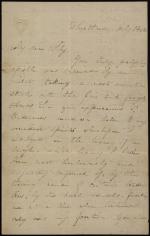
Harriet Lane writes Lily Macalester with gossip about mutual acquaintances and discusses Wheatland. Lane lives with her uncle, James Buchanan, in Pennsylvania. Transcript included.

First Lady Harriet Lane writes to Lily Macalester about the going ons of Washington D.C., her trip to Pennsylvania, Macalester's trip to West Point, as well as various bits of gossip.
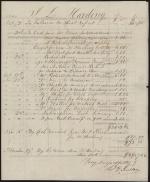
John L. Harding's (Class of 1849) report from Dickinson College in December 1848 includes details about his financial account, his grades, and a message from President Jesse T. Peck.

Secretary of War William Wilkins (Class of 1802) responds William Biddle's questions about bids for harbor improvements in Erie, Pennsylvania.

Charles F.

James M. McKim, a member of the Class of 1828 and an editor at the Philadelphia based The Anti-Slavery Standard, writes to a subscriber, Mr. Worrell.

Thomas McFadden, a member of the Class of 1845, writes Robert Black about life at Dickinson College.
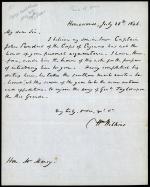
William Wilkins, Secretary of War from 1844-45, writes to his successor William Marcy. Wilkins introduces his son in law, Captain John Sanders of the Corps of Engineers.

Associate Justice of the Supreme Court John McLean, who is also a Trustee at Dickinson College, writes to N. Sargent regarding the death of former President John Quincy Adams on February 23, 1848 in Washington, DC.
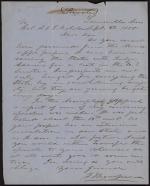
Jacob Thompson writes to Colonel A. O. P. Nicholson and discusses how he expects to win the US Senate seat in Mississippi. Thompson also notes that his speeches have been published in the Memphis Appeal.

United States Attorney General Jeremiah Sullivan Black writes to Jacob Thompson, Secretary of the Interior, with a legal opinion on the question of whether widows of officers and soldiers could receive a government pension if they remarry.
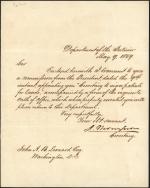
United States Secretary of the Interior Jacob Thompson forwards a commission from President James Buchanan (Class of 1809) to John A. B. Leonard. The commission appoints Mr. Leonard as "Secretary to sign patents for lands."